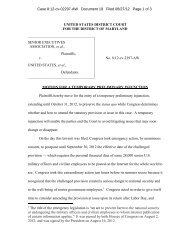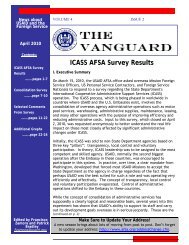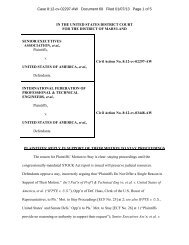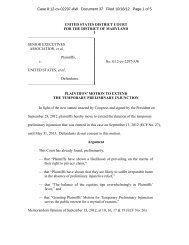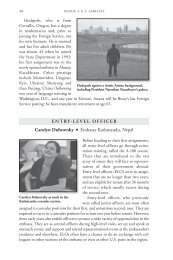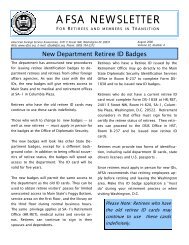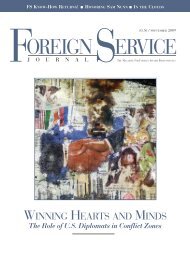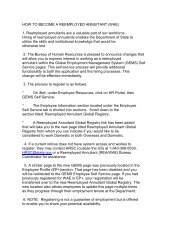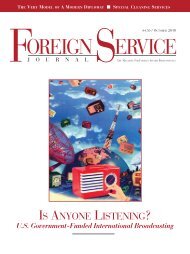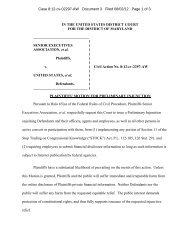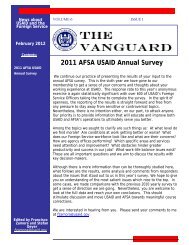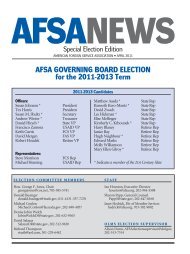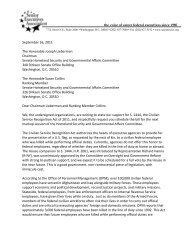F OCUS - American Foreign Service Association
F OCUS - American Foreign Service Association
F OCUS - American Foreign Service Association
You also want an ePaper? Increase the reach of your titles
YUMPU automatically turns print PDFs into web optimized ePapers that Google loves.
the events of August was not a shining<br />
moment in the annals of <strong>American</strong><br />
diplomacy. Well aware by the<br />
summer of 1968 that the United<br />
States could not use military force to<br />
help Czechoslovakia, the Johnson<br />
administration was anxious to deflect<br />
any charge that we were involved in<br />
developments there. Only with reluctance,<br />
and to be able to respond to<br />
Republican criticism, did Secretary of<br />
State Dean Rusk summon Soviet<br />
Ambassador Anatoly Dobrynin on a<br />
single occasion to say that public opinion<br />
in the United States was “beginning”<br />
to view the situation with alarm.<br />
In reality, our use of force was precluded.<br />
In addition, a compelling reason<br />
for this exaggerated restraint was<br />
the hope of Lyndon Johnson and<br />
Rusk to conclude an ill-starred administration<br />
with a trip to Leningrad,<br />
where Johnson and Soviet Premier<br />
Kosygin would promote détente and<br />
arms control. This would have permitted<br />
Johnson to leave office as a<br />
peacemaker. The Soviets milked this<br />
desire with their customary craft.<br />
On the night of Aug. 19, with the<br />
invasion about to commence, Dobrynin,<br />
Washington’s favorite Russian,<br />
conveyed Kosygin’s invitation to a<br />
happy LBJ while quaffing champagne<br />
on the presidential yacht Sequoia.<br />
When Dobrynin called at the White<br />
House the next evening to inform<br />
Johnson and Rusk that Soviet forces<br />
were entering Czechoslovakia, the<br />
president thanked Dobrynin for his<br />
courtesy, promised to study the diplomatic<br />
note with great attention and to<br />
be back in touch. After that there was<br />
good will and even some shared<br />
laughter.<br />
The first telegrams the department<br />
sent warned our allies not to overreact.<br />
Supposedly excitable West Germans<br />
were especially advised to keep away<br />
from the frontier. Our representatives<br />
in international meetings, especially<br />
those concerning disarmament or<br />
arms control, were not to raise this<br />
Dobrynin conveyed<br />
Kosygin’s invitation<br />
to a happy LBJ while<br />
quaffing champagne<br />
on the presidential<br />
yacht Sequoia.<br />
allegedly extraneous matter unless the<br />
Soviets did so first, in which case our<br />
representatives were to keep their<br />
responses brief.<br />
Speaking to Dobrynin, Rusk<br />
referred to Czechoslovakia as a “dead<br />
fish” with which we had been slapped<br />
in the face. More than once, he informed<br />
third-country officials that we<br />
had raised the issue in the United<br />
Nations only because a small country<br />
had been attacked. We had not enjoyed<br />
good relations, he was careful to<br />
point out.<br />
While Rusk’s caution was perhaps<br />
understandable, it was regrettable that<br />
he was unable to recognize that the<br />
Prague Spring, now crushed by an<br />
invader’s heels, had reflected the<br />
ardent aspirations of an entire nation.<br />
We had no way to help the Czechs,<br />
who had no useful friends and only<br />
disaffected “brothers,” but we still<br />
should have sought a more appropriate<br />
way to express our dissatisfaction.<br />
The Legacy<br />
In New York, our representative in<br />
the United Nations, George Ball, did<br />
take note that the Soviet forces<br />
seemed to have come to Czechoslovakia<br />
searching for someone who had<br />
invited them. He commented that<br />
their brotherly help recalled the assis-<br />
tance Cain had given Abel. Even this<br />
mild sarcasm brought a pained lament<br />
from Dobrynin to Rusk.<br />
What did the Prague Spring achieve,<br />
aside from arousing false hopes in<br />
a country doomed to 20 more years of<br />
dictatorship? In November 1969,<br />
Embassy Moscow reported that the<br />
USSR had achieved all of its objectives<br />
in Czechoslovakia at an acceptably low<br />
cost. Most scholars thereafter agreed.<br />
But the Russians paid a price for<br />
their shock tactics. In China, especially<br />
after the battle on the Ussuri River<br />
in the spring of 1969 and a Soviet hint<br />
that Chinese nuclear facilities at Lop<br />
Nor might be surgically removed, the<br />
Czechoslovak experience must have<br />
contributed to Beijing’s growing<br />
awareness that the Soviet threat was<br />
not merely theoretical. This facilitated<br />
Richard Nixon’s strategic breakthrough<br />
to China.<br />
Moreover, the memory of the<br />
spring was not lost to human rights<br />
watchers in Helsinki after the Soviets<br />
achieved their wish for a conference<br />
on security and cooperation in<br />
Europe. Although the Brezhnev<br />
Doctrine was alive and well, memories<br />
of the Czechoslovak resistance made it<br />
more difficult for Moscow to contemplate<br />
the use of force against Poland.<br />
(The same cast of characters in<br />
Moscow should have remembered<br />
that lesson in 1979 before plunging<br />
into Afghanistan, where resistance<br />
would prove to be anything but passive.)<br />
Obviously, Moscow was still the<br />
decider in that part of Europe. Only<br />
when a new generation was in office<br />
there, and when the Soviet Union was<br />
beset with other problems, could<br />
there be a Velvet Revolution in<br />
Czechoslovakia. Jack Matlock, U.S.<br />
ambassador to the Soviet Union, has<br />
written that Gorbachev was hoping<br />
the process would resemble the<br />
Prague Spring. If so, he was selfdeceived,<br />
but we are all better off for<br />
the deception. ■<br />
JULY-AUGUST 2008/FOREIGN SERVICE JOURNAL 57




